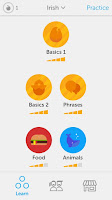- Top tips to study for your Leaving Cert. Johnny Studyalot, who got 10 A1s, gives his advice.
- Getting the best out of your CAO.
- Give it lash, but it's not the end of the world if you don't get the results you aim for.
The last of the three hits home the most. Out of my three core subjects, I attempted two at a higher level, and dropped my Irish out of laziness and a desire to focus on other subjects. I ended up with an A2 in that and in my naïvety waved goodbye to studying the language I had little or no good memories of. Eight years later, that decision has now come back to bite.
 Despite having a Honours Degree in Journalism with a French, I unfortunately don't hold the level of the language required to do a Masters in post-primary education in Ireland. Since moving to Spain, Spanish has been my second language. French meanwhile has been thrown into row Z of my brain's vast filing system.
Despite having a Honours Degree in Journalism with a French, I unfortunately don't hold the level of the language required to do a Masters in post-primary education in Ireland. Since moving to Spain, Spanish has been my second language. French meanwhile has been thrown into row Z of my brain's vast filing system.
I have been presented with two options. One: restart my French studies and aim to sit a CEFR Level B2 in order to apply for a Masters in Post-Primary Education. Two: go back to studying Gaeilge and resit my Leaving Certificate and go down a post-primary route.
I have asked myself: do I want to teach French? Would I be happy to teach it? The answer frankly is no. I just see myself more suited to Primary Education, as it allows to teach and develop with a variety of subjects.
And so begins my latest challenge. Can I shake off the cobwebs and horrific memories of learning Irish in my childhood and adolescence? Can I study from Spain via distance learning and eventually better my result from 2009? Downloading Duolingo and enrolling in a Cursaí with Conradh na Gaeilge in August is hopefully just the start.
This is my latest challenge, and I hope to document as much as possible. You the reader are more than welcome to join!